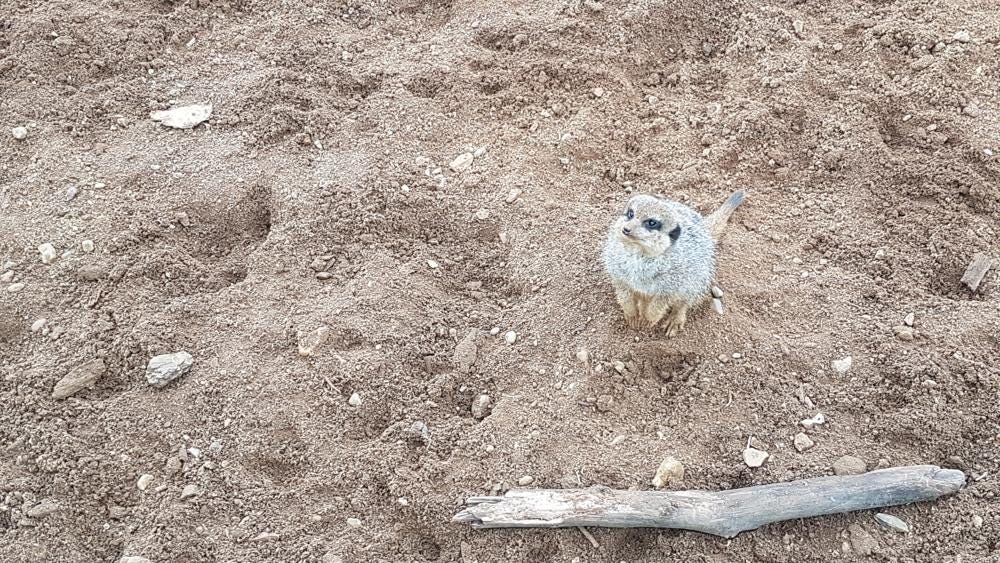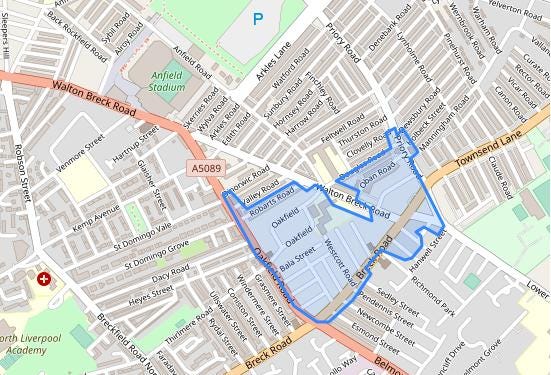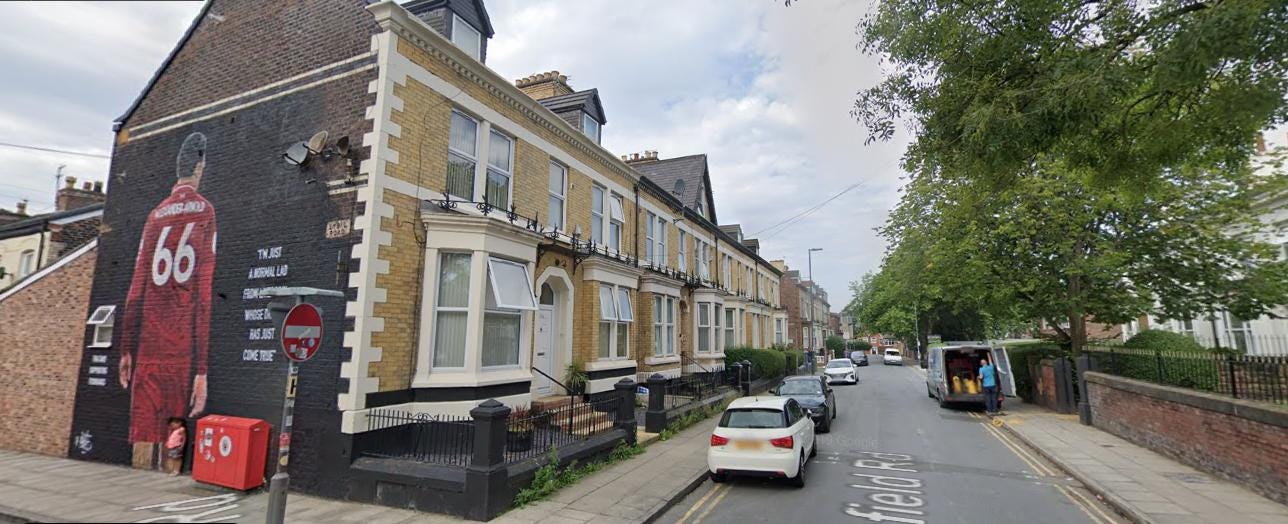Happy Friday
And welcome to the end of the weekend! At least that’s what it feels like for me, after spending the last few days with family in a big old house in Suffolk. I’m returning to a full week’s work today, my Monday morning, fully refreshed.
Hanging out with people under the age of six is good for your health, now more than ever. I did have plans to spend November in France, exploring possibilities of a future. But such plans have a habit of short-circuiting this year and I’m thrown back on an alternative—no worse, no better in a deterministic universe—but disorientating nonetheless.
As my niece said during one particularly tiring car journey:
Are we nearly here now?
Bloody good question, kiddo, bloody good question.

Above: A meerkat at Jimmy’s Farm. In a meerkat colony, only dominant members will breed. Everyone else helps support their pups. But female subordinate meerkats help female pups more than they help male pups. Sometimes subordinate meerkats only pretend to feed the pups, keeping the food for themselves instead.
Shankly’s Life and Death: Food banks not football
This might look like a story about football, but it’s not. It’s a political parable with a footballing backdrop.
i.
Folkloric Liverpool Football Club manager Bill Shankly once said:
Some people believe football is a matter of life and death, I am very disappointed with that attitude. I can assure you it is much, much more important than that.
Except he didn’t. He didn’t say that at all. What he actually said was:
Somebody said that football’s a matter of life and death to you. I said, ‘Listen, it’s more important than that.’
And this line was not—as is so often assumed—a piece of swaggering braggadocio delivered at the height of his championship-winning fame. This was Shankly speaking four months before his death and expressing an intense regret that he’d put football above even his own family.
Watch this short clip for a sense of the man’s passion for football—and the sincerity of his regret he’d allowed it to overwhelm everything else in his life.
ii.
According to the COVID Symptom Study, the city of Liverpool currently has a COVID-19 incidence rate of about 1.6 percent—about double the rate of southern England, where I’m writing from.
It was bad enough to put Liverpool into tier three local lockdown ten days ago. Pubs and bars are closed and residents must not socialise with others outside their household or support bubble.
There are more important things in life and death than watching live sport, but football fans can’t watch the game in stadiums, they can’t watch on a big screen down the pub and now they can’t even have their mates over to watch Liverpool on the telly.
It’s in this environment that nineteen of the twenty Premier League clubs (credit to Leicester City) decided, together with broadcasters BT Sport and Sky Sports, to start charging additional one-off fees for a total of 150 league matches.
The Pay Per View charge of £14.95 per game comes on top of the cost of television subscription services, on top of the cost of season tickets, on top of the cost of the pandemic and on top of desperate—and pre-COVID—deprivation in Liverpool.
According to a 2018 parliamentary research briefing, nearly 30 percent of children in Liverpool were living in poverty. In 2019, Liverpool was ranked as the third most deprived Local Authority in England.
One neighbourhood is ranked inside the top ten most deprived in England. That neighbourhood is a five minute walk from Anfield, the home of Liverpool Football Club.

Above: Liverpool 019C, according to government statistics, the tenth most deprived neighbourhood in England (Map Source)
The Pay Per View scandal reminds me of one of Bill Shankly’s slightly less famous quotes:
At a football club, there’s a holy trinity—the players, the manager and the supporters. Directors don’t come into it. They are only there to sign the cheques.
How times change.
iii.
Times might change, but collective action can still dictate its direction.
Last Saturday, Liverpool played a game against Sheffield United. I won’t mention the score, because, as Shankly was trying to say, some things are more important than football.
The match was significant because it was Liverpool’s first that was only legally available on a Pay Per View subscription. But it was a night when fans chose a different direction.
Fans Supporting Food Banks (FSFB) is a joint initiative launched in 2015 by rival fans of the two Premier League clubs in Liverpool, Everton and Liverpool, to fight food poverty in the city. For the past five years, FSFB been responsible for about a quarter of all food bank donations in Liverpool. It’s a story that belies the narrative of the brainless, chauvinistic football fan.
FSFB and Liverpool fan groups, including the Spirit of Shankly Supporters Trust, urged Liverpool fans to divert their Pay Per View subscription to food bank fundraising. Rather than pay £14.95 to watch Saturday’s game on Pay Per View, fans who wanted to support people, not profiteers, helped FSFB raise over £125,000 for food banks in Liverpool.
This isn’t an isolated case. The weekend before, Leeds fans raised £57,000—doubling annual food bank donations in only five days. In protest at the Pay Per View game before that, Newcastle fans raised more than £60,000.
Almost every supporters group in the country has put their voice behind the boycott and so far football fans have raised over £300,000 for desperate people in their communities.
Liverpool Football Club have given me a lot to be meaninglessly proud about, over the last two years in particular; it’s nice to feel proud about something meaningful now too.
iv.
Of course, it’s not the responsibility of the Premier League, the football clubs or the supporters to feed people who are struggling due to the erosion of the social fabric of human society. Another organisation already has that job: the government.
According to the Independent Food Bank Study, food banks are a ‘post-2010 phenomenon’. Coincidentally, that is the very year that the Conservative Party first came to power.
A decade after David Cameron first pushed open the door to Number 10, food banks are giving away millions of meals to people who are struggling to support themselves. In many cases this is because of failures in the benefit system—but the primary reason people are referred to food banks is because of low income: they have jobs, but the wages don’t cover their diets.
This is data from 2019, before the pandemic, which, according to Scotland’s independent food banks, has already doubled demand.
So no: it’s not the responsibility of the supporters to help feed their fellow human, except insofar as the supporters are also citizens, who will take responsibility. That’s what human beings do when they see other people struggling around them, especially after hearing their elected government throw off responsibility, not with excuses, but with insults.
This doesn’t merely belie the popular image of the selfish, loutish football fan; it belies the Conservative death wish that society is best served by individuals and families looking out for themselves. That individualist, familial model doesn’t work. And the strength of its cooperative alternative has been amply demonstrated, in this case, by the most tribal section of modern society: its football fanatics.
v.
The government, the Capitalist Media and even the club owners themselves like to forget that football, even the multi-billion pound business of Premier League football, is first and foremost a community event. That’s why the teams have names like Liverpool and Everton (a district of Liverpool) and not names like Standard Chartered FC and Nike FC.
Anfield Stadium is a community building, set in a neighbourhood of ordinary terraced housing on Anfield Road. Look: a middle-aged bald man loads up his van, a white hatchback parks on double yellow lines, someone opens a window to air their living room on a pale spring morning.

Above: This is Anfield. Terraced housing on Anfield Road, neighbouring Liverpool Football Club. (Google Streetview)
Everybody knows that there is a lot of money in football, but most of it is tapped from its millions of supporters. So if the Premier League clubs and broadcasters won’t do the right thing, then football fans must—and will.
In the past couple of days there have been signs that the Premier League and broadcasters might decide to reduce the swingeing price tag of the PPV subscriptions. It’s bad for their image, they say, and the viewing figures have been ‘disastrous’.
I’m sure it’s already too late.
More than most, football fans know what can happen when thousands of people are united behind a common cause—the team wins trophies. Now we have seen what can happen when thousands of people are united behind a common political cause—food banks filled, families fed, governments shamed, politicians held to account and fans radicalised.
vi.
I said at the top that this might look like a story about football. It’s not, of course. The stage scenery is football, but what we have here is a story of a community taking charge when they have been failed by central government. It’s a story that inspires others to take seize power in their own communities and use the collective will to do the right thing.
Other managers won more trophies, but Bill Shankly, a socialist, holds a special place in Liverpool folklore for building the football club on the solid rock of its community. A football club is only as strong as its supporters; a nation is only as strong as its neighbourhoods.
Together we can do the right thing when our government is wrong; together we can lead when our government is feckless. As Shankly might have said:
Politicians don’t come into it. They are only there to sign the cheques.
Addendum
By the way, I have no problem with footballers making millions of pounds from their short careers. The money is obscene, of course, but I’d start by pointing the finger elsewhere.
According to the 2019 Global Sports Salary Survey, the average annual salary for a Premier League footballer—the best of the best, in other words—is £3.1 million. That’s still less than the average annual salary of the ‘best of the best’ businessmen in the UK—FTSE 100 CEOs—who are paid 117 times more than the average worker earns in their businesses.
And, of course, a top CEO might spend 20 years earning that kind of salary, with another couple of decades at lucrative positions lower down the ladder too. A top footballer is lucky if their entire career, from teenage star to journeyman pro, lasts 15.
Footballers, by and large, are working class men and women who couldn’t afford to buy their way onto the top table. And, unlike the executives who herd into high paying jobs from a place of privilege, Premier League footballers bring joy to millions all over the world.
That football’s highest earners—Marcus Rashford, Raheem Sterling and Trent Alexander-Arnold to name but three—are using their position to lead conversations around social justice shows that they too understand that their strength is the strength of the community.
A message from a refugee stuck in the Napier Barracks
This heart-rending message was written by a young Iranian man I met in Samos last year. I first met Nima when he was volunteering at a restaurant that helped to feed hundreds of other refugees trapped on the Greek island.
Nima already had his travel documents: he could have left Samos any time. But he was prepared to wait months and months for the bureaucracy to approve papers for his best friend, Omid, so that they could travel onwards together.
Omid and Nima were inseparable. Brothers in a world without family.
The day before I left Samos last October, Omid was granted his papers. They celebrated with a dinner party in the restaurant. A moment of hope on an island of despair.
A year passed. Omid and Nima finally reached London, as they’d always promised, together.
It was in London where I was given the freedom and opportunity to feel normal again. After all this time I felt like a human, no different from every other human.
Normality was brief. A few days ago, Nima was thrown into a camp called Napier Barracks.
Alone.
The only thing I asked for was for Omid to come with me. Don’t leave me alone. Please. We made it this far, together. Why wouldn’t we continue together? It’s not my journey. It’s our journey. And doing it without him translates into emptiness. An emptiness that doesn’t fit inside me.
✒️ Recently…
🍽️ Thought for Food #1: Making an Effort (23 October)
🌈 Swallow the Rainbow (23 October)
💥 Tintin Versus The Foo Fighters (16 October)
🧠 Stroke Values (9 October)
🌿 Britain: Dope Capital of the World (9 October)
🚴 Always available: the collected scribblings of my round Britain cycling adventures
Any more for any more?
Three notes of decreasing length, about growth and decomposition.
I’ve been guilty of this rookie error, so don’t feel bad, but we should never throw our banana skins into the undergrowth when we’re walking in the countryside. Banana skins are a big problem for conservation: especially in natural beauty spots haunted by humans.
Their rubbery skins take up to two years to decompose—and when they finally do, the high levels of potassium throw off the nutritional balance of the local ecosystem. We’re effectively poisoning the soil. On top of that, animals have trouble digesting the skins—bananas aren’t a native diet for British wildlife.
We should either compost our banana skins at home or throw them into a smoothie and eat them! If we can’t do either of those, then let’s take different snacks on our walks, ones we can devour in their entirety: berries, nuts or dried fruit. My number one hiking snack is apples—but I eat the core!
Whatever you do, leave no trace.
2020 is a mast year for oaks. Every 6-7 years, all the oak trees in Britain get together for a pow-wow and decide to ditch millions more acorns than in other years. It’s a plot to overwhelm predators and ensure that more oak seeds make it into the ground and grow up to become the mighty giants of the countryside. Leave enough for the animals, but this is the year to gather acorns and eat them!
Finally: Egypt is growing forests in middle of the desert. Awesome.
That’s it—thanks as ever for reading. I hope you aren’t feeling too down about the fluidity of your best-laid plans. We don’t live in an ideal world, we live in a world of ideals.
Are we nearly here now? You decide.
Big love,
dc:
CREDITS
Hello, I’m David Charles and I wrote this newsletter. I publish another newsletter about reading called Books Make Books. I’m co-writer of BBC Radio Wales sitcom Foiled, and also write for The Bike Project, the Center for International Forestry Research and Thighs of Steel. Reply to this email, or delve into the archive on davidcharles.info.
Unlock the commons for £30
These free weekly newsletters are currently 7.8 percent funded. You can unlock the commons for everyone forever (or at least until the Internet falls asleep) by becoming a paying subscriber from £30 per year—that’s 58p per newsletter. I donate 10 percent to help promote equality and justice. Thank you.



